#and my apologies to the general fandom
Explore tagged Tumblr posts
Text
future teen: mom, can I buy this Sherlock Holmes DVD?
weeb mom: we already have Sherlock Holmes at home
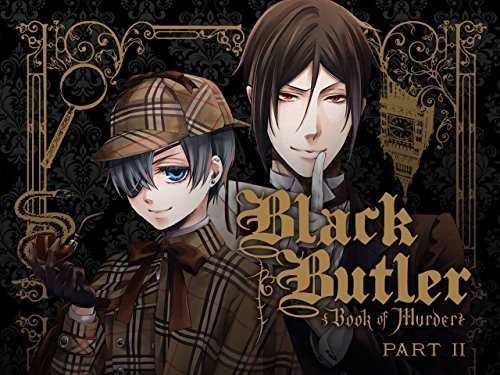
#black butler#kuroshitsuji#ciel phantomhive#sebastian michaelis#hello it's me again after going insane#and my apologies to the general fandom#i've discovered the wonders of this manga kinda 2~3 years ago#so i'm still catching up to my own feelings
196 notes
·
View notes
Text
Ghostknife?????



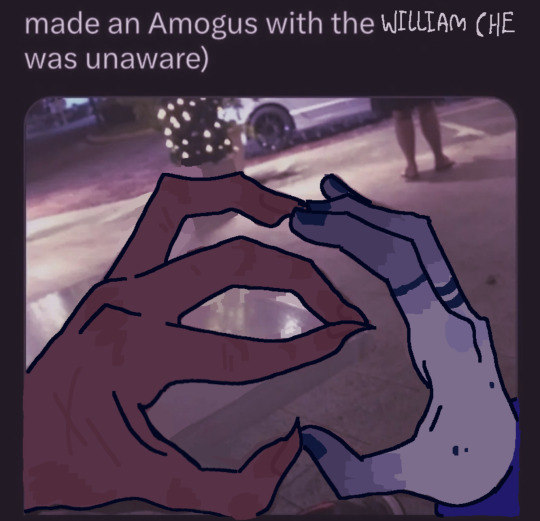


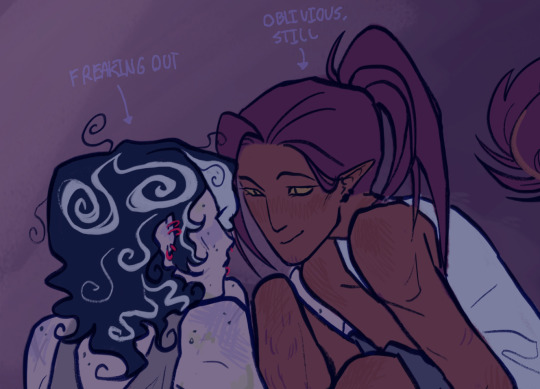
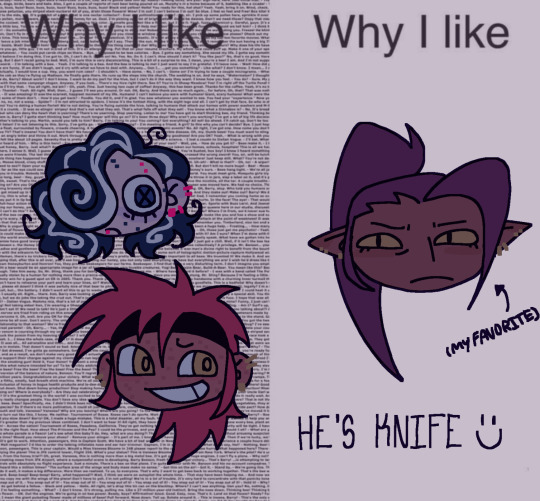


Do people still ghostknife?????? Im ghostknifing. Personally.
#apologies if some of the memes have already been done-#ghostknife#jrwi#prime defenders#just roll with it#vyncent sol#william wisp#vyncent is aroace and ghostknife is weirdly kind of queerplstonically requited but not really but also kind of to me#theyre a secret third thing#truly#and i love them for that#vyncent my beloved#i want them to have such a devastating rejection scene but then later vyncent is confused why william is so distant now#cause he doesnt really get it but he does wanna be close like they always were#but its different to william#do you get me#it makes me upset and i love them 💕💕💕#they still need a real kiss/confession in s3 because of what s2 ep14 did but i love how weird they are#i just love undefined relationships sigh#if ghostknife becomes fully requitedly canon it should be last episode of the series ever i think thatd be funny#anyway#sorry if the memes are mischaracterized#im rewatching pd rn so my brain is kinda stuck in s1 lowkey#maybe ill be funnier when i get to s2#but like the new life series is coming up so who knows honestly#kinda scared to post this cause it feels like this fandom has a very specific idea of how youre meant to portray the characters??#like not visually but generally#idk#i feel like theres some secret rule im breaking#shrug
401 notes
·
View notes
Text
This is where I belong.
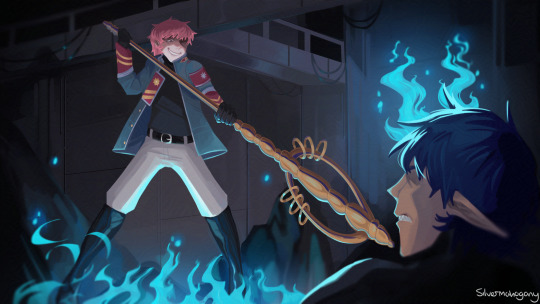
#GODDDDDDD ITS FINALLY FUCKING DONEEEEEEEEEE#splash art for my concept art uni assignment. id better get a damn good grade on this#exploding and dying#apologies for the glaze but if this ~40hr piece got scraped for some generated bullshit id scream and shit myself#anyways <3 a gift for you beloved aoex fandom i love you all#ao no exorcist#blue exorcist#renzou shima#rin okumura#my art#glazed art#aonoex#aoex
214 notes
·
View notes
Text
Seeing people say Curly got “what he deserved”, “his just desserts”, and “he got what was coming” (all of these being real quotes I’ve seen verbatim) regarding him getting horrifically injured from the crash both really piss me off, and also scare me ngl.
Curly really messed up, there is absolutely no denying that no matter how you look at it. But to say with genuine seriousness that he deserved what happened to him is absolutely ridiculous and extreme. He should get consequences, yes, but those consequences shouldn’t be getting a majority of his skin burnt off, losing all four of his extremities, losing an eye, being left laying on a cot in absolute agony, and being subjected to Jimmy’s abuse.
Also, I don’t think I even need to point out how incredibly ableist comments like those are. To imply becoming disabled is “punishment” or “karma” in some way is such an awful thing to say, and if you genuinely think that way I hope you stay far away from disabled people until you reevaluate yourself.
Lastly, it’s completely fine if you dislike Curly. I’m not here to try and change your minds on that. But what I am trying to change your minds on is how you view disabilities and thinking on what truly counts as proper consequences for a guy who isn’t as black or white as many paint him out to be.
#(Im sorry for such a serious post like this but Ive seen too much comments like this go unchallenged)#(I might as well be the one to say it especially since this isn’t my first time pointing out the ableism in the fandom)#(also I apologize if I seem especially angry here but seeing comments like those just make me really uncomfortable and angry)#(At the end I just want Curly criticism that doesnt excuse him for what happened but also doesnt say that he should be skinned alive)#(also criticism that has no ableism in general but thats honestly a general thing than just a mouthwashing thing)#my post#mouthwashing#mouthwashing game#captain curly#curly
101 notes
·
View notes
Note
Do you think if the trolls all came back, like everything in the main comic did happen and they were alive again. Do you think Feferi would actually forgive Eridan? Or want to even be his friend after everything? I don't personally like the erisol and fefertasprite interaction…felt rushed…..so I just wanted to know your opinion if things were different! :)
Yeah, I think they would be! Feferi is one of the trolls who takes dying the least badly (relentless optimism) and Eridan does genuinely feel bad, which means a lot when it's Eridan. I think she really is genuine when she says she wants them to be friends and also that she's really not the type of person to hold a grudge, and like... death is SUPER cheap in Homestuck, it's really not the horrific, irredeemable, irreperable damage that it is IRL - and if you're talking about (Feferi) and (Eridan), then they're both dead (and irrelevent) now, so the score is kind of even.
In general, the fandom - I mean, people in general, really - tend to have difficulty divorcing themselves from other people. We tend to assume that the people and characters they like will hold similar opinions to themselves. This is how people who like Karkat and don't like Eridan can mentally gloss over or even block out their clear, close friendship, or how people who dislike Cronus can end up overlooking that Meenah actually takes his opinion seriously and unironically defends his wizard thing. Feferi really isn't mad at Eridan or upset about dying the way we probably would be, because she's friends with the horrorterrors, relentlessly cheerful, comfortable with death in general, and death is also just not really that big of a deal in this setting. "I'm really sorry about that, that was shitty of me" is honestly probably all the apology she needs, especially if they came back to life anyway.
#i dunno in general the fandom loves to blow stuff up#and make it all way way angstier than it needs to be or was even shown to be#by all accounts feferi takes dying really well#im sure shes still not STOKED to be eridan's friend again but out of all her faults#holding long unreasonable grudges isnt really one of them#(that's a kanaya thing actually)#eridan's always gonna be an annoying pest to her in large doses but i think she basically thinks of him as a friend#also eridan responds to problems overwhelmingly with Fight#so this idea that eridan will be forever mopey and angsty also doesnt ring true to his character#if anything i can see him becoming annoying again because now he won't stop fucking apologizing#like bro chill its fine already oh my god why is everyt)(ing suc)( a PRODUCTION wit)( you#because thats the last point too like#homestuck always returns to humor#hussie even says in the book commentary that homestuck is lighthearted and comedic at its core#that it keeps returning to that as a touchstone#even during its tensest moments like murderstuck theres just constant funnies and gags#so i just end up going kinda :/ when an interpretation is purely maudlin or cathartic#like its more homestuck when its funny and characters treating murder with the same gravitas as irl#not only doesnt make sense in universe where death is cheap - ESPECIALLY for trolls#but also just doesn't really feel very homestuck to me#but that is 100% personal taste so if you like that stuff by all means keep enjoying it lol#you just arent going to get uber angst from me u_u
99 notes
·
View notes
Text

Confession...
#what can i say except. i will not apologize for my beautiful thoughts#i feel like star wars fandom would agree that general grievous is hotttt.
34 notes
·
View notes
Text

is this a scene of What Happened In 1650? possibly.
did i just want an excuse to draw them in 1600s dresses with weapons? absolutely.
will i ever write this? probably not but a guy can dream.
am i aware that this isnt the best art? yes.
am i posting it anyways? yes because i worked too long on this not to show it off now shut up my hands hurt.
#if you’re wondering what the random white blobs on az are#it’s called the-mistakes-whiteout-just-made-worse#also#apologies if aziraphale does not have the adequate tata size necessary for the general fandom consensus#you can blame that on the way 1600s dresses are structured#good omens#good omens fanart#fanart#my art#traditional art#crowley#aziraphale#fem crowley#fem aziraphale#fem aziracrow#ineffeble husbands#ineffable wives#crowdoesart#fuck neil gaiman#pirate good omens
25 notes
·
View notes
Text
#poll#this is just a poll! all chapter lengths are valid & great & generally depend on the narrative!#i'm just curious what the consensus might be among the masses#and by “masses” - i mean the 12 people reading my blog#lemony snippets#i will probs rb this a few times over the next week so apologies in advance!#did i arbitrarily choose 15 chaps as the longfic threshold? SURE DID call me captain arbitrary for this whole thing pls & ty#for science!#fandom#fanfiction#yeah throw a coupla tags in there that might bump this a bit - also for science a;sdlfkj#someone has probably already polled this but i am Too Lazy(tm) to try searching for it on the tumblr
13 notes
·
View notes
Text
The name "Sonic x Shadow Generations" implies that the game is going to be about Sonic and Shadow's eventual pregnancy and family lineage
Good for them.
#mewo rambles :3#sonic x shadow generations#sonadow#sonic the hedgehog#looking forward to the birth of Sonic and Shadow's kids#hope everyone else is 🫶🫶#Consider this tag my formal apology to the Sonic Fandom#and also for the unorigional joke im sure this has been done like 100 times alr#i wouldnt know#I have no clue what haopens in Sonic games anyways
32 notes
·
View notes
Text
You guys haven't yet met the last two protagonists in my main WIP trilogy. The ironic part is these were the first two characters I came up with for the story...

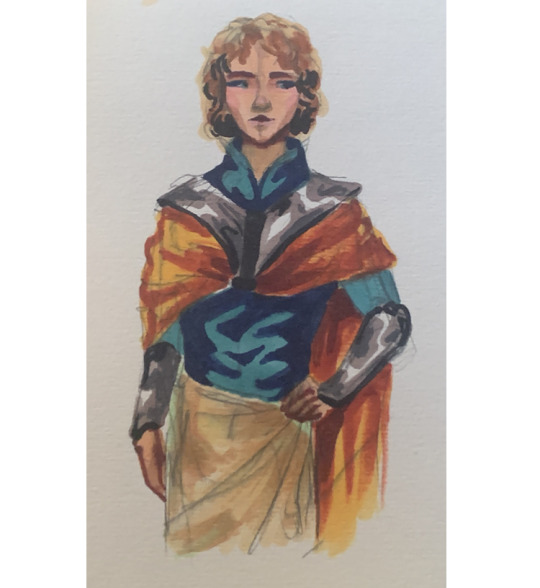
There, now I have the whole collection on the blog.
I'm still doing character design stuff so I don't know if these are exactly the final looks for either of them, but they're close enough to what I'm going for right now that I don't mind posting them.
#halogen#metalloid#i write sometimes#death by procrastination#my trash#/end classification tags#that second one was my second attempt at using markers for art in probably over a decade#i was STRUGGLING#you guys have probably figured out by now that i generally stick to black and white when i'm working with traditional mediums#it's probably because of a mix of not being able to cover up mistakes and not wanting to have to carry around so many art supplies#in any case i just never learned how to use them#so that's why metalloid's picture looks odd#his hair is not supposed to be that dark on the lower layers#i just picked the wrong color of marker and had to commit#again apologies for all the non-fandom art#i have been working on this story in particular a lot lately and it kind of has priority over everything else when it comes to my free time
14 notes
·
View notes
Text
Almost back home!!! I’ve been away for two weeks and I haven’t had good internet connection. Looking forward to getting back home.
I’ve been quiet cause of it, so how about a shop/merch update!! The products from my shop have already gone through a round of proofs this last week after I placed the order (as some files had gotten mixed up). I’m hoping the products finish their manufacturing and are shipped to me within this next week or so!
I’ve ordered extras of everything to put up in the shop as “in stock” after I send out my preorders, also ordered a few items as samples. They had a higher MOQ (minimum order quantity) so if they turn out well, I’d like to do a giveaway with some of them!
#I know I’ve been kind of quiet in general lately too apologies for that#gonna be honest and life has been pretty rough lately#general TW I reference death below#two incidents happened a few months ago regarding almost losing brother and losing a cousin to horrible situations#and it’s really been very difficult to deal with and has brought on a lot of haze and mental dullness or inability to focus#and tbh even months later it’s still been very difficult#it’s why I’ve probably come across as closed off or absent these last few months#so just explaining that#I’m still overcoming it but I believe I’m doing better now#I have been unable to mentally pull myself together enough to successfully create any content like fics or art#though I’m trying very hard#it is getting easier too. I have written a lot more on vacation than I’ve mana fed to write in a long time#I still love and appreciate PLA and submas so so much that just hasn’t been able to manifest in content creation lately#but it has manifested in buying merch haha#when I get home I may just show my collection#I am still alive in this fandom#if you’ve read this far thank you#and thank you for sticking around while I’ve been quiet!!
42 notes
·
View notes
Note
as a huge fan of the original ACD canon, I desperately want to hear your elaboration about why you don't like BBC's Sherlock :D
hi OP I hope you're ready for a monster essay in response because that's what I ended up with!
For ease of reading I've divided up my answer into four sections: 1) explaining Arthur Conan Doyle's Sherlock with historical context, 2) analyzing BBC Sherlock/Moffat's Sherlock using a cross-section of Watsonian and Doylist techniques and sheer spite, 3) my thoughts on Johnlock, 4) comparing & contrasting Doyle's Sherlock with Moffat's Sherlock. Disclaimer: I'm not a historian, although I do I have some understanding of the history of detective fiction. Mostly I'm just an avid reader/fan.
Part I: Original Sherlock
To start with! I will talk about the characterization of Arthur Conan Doyle's Sherlock Holmes. Here's something which people who have never read the stories don't seem to know: Sherlock is kind.
He's not particularly nice, I'll give you that. He tends to think he's the smartest person in the room, and you know what? He almost always is. He has plenty of dry and sarcastic comments for the London police, for clients who don't bring any evidence, etc. But he goes out of his way to be kind. My favorite example of this is the Boscombe Valley Mystery.
The Boscombe Valley Mystery is far from my favorite Sherlock story in terms of mystery-solving, but one of the best in terms of characterizing Sherlock. To summarize: two wealthy, widower landowners, John and Charles, are next-door neighbors with one kid each–John, a daughter named Alice and Charles, a son named James.
Sherlock gets called in when Charles is found murdered, and everyone suspects James of doing it. Of course, it's not that easy. It turns out that twenty years ago, John was a highway robber in Australia, and he robbed Charles but left him alive. John then left the life of crime, started a family and settled in England a wealthy man. Then Charles moved in next door, recognized John, and proceeded to blackmail him for money, land, etc. This escalated until eventually Charles demanded Alice's hand in marriage for his son James. John refuses, and eventually kills Charles to protect Alice and to free himself from Charles' blackmailing/tyranny.
(The problem is that James is actually a decent person, and he and Alice are secretly in love, but there's also a bar maid involved and it's complicated and not relevant. Anyways).
Of course, Sherlock being Sherlock, he figures out that John is the murderer. But here's the thing: he defends John. He doesn't turn John (or his signed confession) over to the authorities. In fact, Sherlock goes to court to protect James by arguing that there's not enough evidence to find him guilty. Sherlock catches a murderer, goes "you know what? He was kind of right tho" and looks away.
Do you understand how radical this is for Victorian England? This is the 1890s. People still believe in God over gravity. The idea that a criminal isn't a criminal for life? That a highway robber can turn over a new leaf? That a murderer can be in the right? [Now would be a good time for a source] Like this is so new, I can't think of a way to translate it to the 21st century.
And it's key to who Sherlock is. He puts his reputation on the line for this case. He says that he didn't manage to solve this case, even though he did. His professional pride and reputation is worth less to him than protecting John, a MURDERER, and James, his son who admittedly is a nice guy whose worst crime is making dumb decisions in college (see: the bar maid).
Because here's the thing about Sherlock's "professional pride:" it's not "I'm the smartest person" or "I'm always right." Sherlock genuinely believes in his deduction method, not as a superpower which he alone possesses, but as a tool which anyone can use if they apply themselves. Which brings me to my second example: Irene Adler.
If you (general audience) only know Irene Adler from BBC Sherlock, I'm gonna ask you to forget all of that right now. Arthur Conan Doyle's Irene Adler is an American opera singer who used to be in a relationship with the future King of Bohemia. The king asks for Sherlock's help retrieving an incriminating photograph that Irene Adler has threatened to send to the king's future wife (a Scandinavian princess) and her family. (Irene Adler is currently in England, getting married to some guy named Norton).
Sherlock promptly gets outsmarted by Irene Adler. She leaves for America with Norton and the photograph, though she promises not to use it against the King of Bohemia, and keeps her promise. Because here's the thing about Irene Adler: she's not a criminal. She's not a bad guy in any way. She doesn't blackmail the king. She had a fling with the King of Bohemia, eventually moved on with her life and married Norton. When Sherlock came sniffing around for her private property, which she was under no obligation to return/give up, she got the hell out of England.
Despite this, Irene Adler is often framed not only as a criminal but also as Sherlock's love interest in adaptations. (And I'm not even talking about BBC Sherlock, trust me, we'll get to that). I think this is due to a fundamental failure or refusal to understand the nature of Sherlock's interest in Irene Adler. He explicitly states that he is not romantically attracted to her. (And neither is she to him). He is impressed by her intellect. It is rare enough for Sherlock to be outsmarted; I think Irene Adler may be the only example in the original stories where the person/group who outsmarted Sherlock was not a career criminal or other type of evil-doer (such as the KKK, in The Five Orange Pips, yes that KKK).
For all intents and purposes, Irene Adler is an ordinary woman, trying to do an ordinary thing (get married to Some Guy), who just so happens to get one over Sherlock in a case where he is arguably in the wrong. That is what makes her so special. Sherlock believes that his deduction methods can be implemented by anybody, but here's somebody, actually implementing them! And she was trained as an opera singer, not as a detective or some such field! And she's not using it to systematically murder or blackmail or anything else, she just wants to live her best life away from this Bohemian nonsense!
Sherlock is excited when someone outsmarts him. And it is so rare for there to be no horrific crime taking away from that excitement.
In summary: Sherlock Holmes is a perfectly well-mannered English gentleman (the social class, not polite descriptor) with shockingly progressive morals for the 1890s, a need for brain puzzles and adventures, and a non-debilitating addiction to crack cocaine.
Some other notes about original Sherlock before I move on to the next section:
Sherlock indirectly caused someone's death in The Adventure of the Speckled Band, and does not feel at all broken up about it. Honestly? I respect that.
Doyle was not perfect. Irene Adler was smart "for her sex." All of the stories mentioned above contain examples of foreigners importing struggles to England. Violent Americans from Five Orange Pips, armed robberies from Australia in Boscombe Valley, loose(?) Bohemians(???) in A Scandal in Bohemia, a mercenary and violent "doctor" from Calcutta (though English by birth) in Speckled Band, etc. I could go on. And I am sure that he made some claims later proved to be scientifically inaccurate.
Aside from Doyle's biases, the Sherlock Holmes stories are also prone to the same real-world changes as any other famous series. Doyle famously killed off Sherlock only to bring him back due to the public outrage. The many, many short stories vary quite a bit in quality, and a little in consistency. Sometimes you just have to throw your hands up and go with the Doylist (heh) reading. We'll get back to this.
Sherlock would not be caught dead in Buckingham Palace wearing only a bedsheet. He often disguises himself in the short stories, as a grandfatherly figure, faking a Cockney accent, as all a manner of (typically older, and therefore less threatening) men. Part of his strength as a detective is his awareness of social circles and the workings of society. He uses it to his advantage, he doesn't provoke public scandal.
He's a private person. He didn't ask to be famous, or to be memorialized as a genius, and again, he doesn't go around looking for adoration or outrage.
Sherlock scorns romance, yes, but not in an internalized aphobia, "I'm suppressing my emotions/desire for the sake of The Case" kind of way, but in an "I'm the only reasonable person here, the rest of you are just weird" kind of way. We'll get back to that one.
Sherlock did have Moods. He also did drugs. But drugs didn't have the social context of drugs now.
Sherlock was superhumanly strong, for no particular reason? There's one story where someone threatens him (in his own flat, no less!) and he remains very polite and unflustered by it. Once the man leaves, he picks up the metal poker that the man bent and straightens it.
Honestly the disguises and the hand-to-hand combat made original Sherlock so OP. I'm not projecting modern values onto old characters, you are. Send Tweet.
Doyle was a spiritualist?!?!?! Like a committed believer in ghosts. Like so committed it ruined his friendship with Houdini. Yes, Harry Houdini. This is not relevant, I'm just impressed that an author so spiritual could write a character so famously and firmly rational.
Okay that's the important bits for original Sherlock. I could easily double the length of that section, but I hope it's clear enough now why I consider original Sherlock to be Very Cool and Interesting.
Part II: BBC Sherlock
Boy oh boy oh boy oh boy. Where to start with this one. Well, here's hbomberguy's 2-hour video essay on why BBC Sherlock is trash, to start. It's been a long time since I watched it but I recall it focusing more on its creator, Steven Moffat (and what that man did to Doctor Who as well, God sometimes I just lay awake thinking about every precious thing Moffat was allowed to put his slimy hands on). So I will attempt to focus on a few key things I don't remember hearing in that video essay.
First: The Trope of the Autistic Genius. I'm sure you (general audience) have seen this in some form of media: a socially awkward or unaware character, perhaps outright on the autism spectrum, perhaps just Weird™ who is a genius in a particular field. It's related to the Idiot Savant trope, thanks TV tropes, and portrayals range from a cute fictional romance with an autistic lawyer in Extraordinary Attorney Woo to the somewhat real-to-life story of John Nash, a real mathematician who made incredible contributions to the field of economics and also had incredibly difficult personal relationships due to his schizophrenia.
For some reason, Moffat decided to use this trope for Sherlock Holmes. I say "some reason" but it's pretty clear why: Sherlock is a genius. And there's a long tradition of "genius as a curse" characters where their intelligence comes at a cost: their ease of relationships with other people. Sometimes this is an explicit curse where the character traded power/intelligence/money etc. for the ability to feel (romantic) love (see: Howl's Moving Castle the movie). For the autistic genius, usually the price of their ability to grasp concepts (usually math or some type of science) beyond the understanding of Mere Mortals is their ability to understand people and social cues.
The thing is, the way Moffat does this with Sherlock makes no damn sense. He's a detective. His whole ass job is to understand social cues, human behavior, motivations and generally what makes people tick. There's probably a good way to make Sherlock autistic. However, the way Moffat does it creates this inherent contradiction, where Sherlock swings wildly from totally missing social cues to perfectly understanding people's desire and motivations. Make it make sense. Make up your mind. Is your Sherlock a tortured genius who cannot understand or relate to normal Molly Hooper, or is he a brilliant detective who Gets how people work? You (Moffat) can't have it both ways. It doesn't make any sense.
Second: the Reading People as Superpower thing. Moffat fully subscribes to the idea that you (general) can just look at somebody and deduce their whole backstory. This one pisses me off personally because it leaks to real life all the damn time. The phone charger is probably the most infamous example of why this doesn't work. (Fun fact, if the area around your phone charger is scratched from you repeatedly failing to plug it in, that doesn't mean you are an alcoholic!)
But it occurs both in BBC Sherlock and IRL. Usually IRL people are nice enough to only say out loud something that they think is positive. But here's the thing: they're almost never right. I've had nice little old ladies tell me "I can see that you are XYZ type of person" in the most well-meaning of ways and be completely off the mark. Not a single person who has guessed my race (out loud) has gotten it right. But I'm not just saying "don't make assumptions for the big things like race/sexuality/religion etc." I'm saying, we all make those assumptions when we first meet someone, whether we like it or not. But we have a choice whether to act on those assumptions. Reading people is not a fun thing smart people do in media, it's a common thing all of us do despite not having a higher chance of being correct than Moffat was with the phone charger thing.
The "you can read into anything because there's secret meanings behind everything" that BBC Sherlock encouraged led to one of the funniest and most pathetic phenomena in fandom: The Secret Good Sherlock finale. There's a good 1.5 hour video essay about it and how a portion of BBC Sherlock fans deluded themselves into thinking that the horrible, horrible ending of BBC Sherlock couldn't be real, and that there was a real finale coming if you just followed the clues where Johnlock was canon (more on that later). Because they just couldn't accept that this show which portrayed itself as so clever and Moffat as a 4D chess-master always fifteen steps ahead, was just Not Good.
(Side note: I missed all of the BBC Sherlock fandom experience despite watching the show, because I watched the show with my family. We all knew Doyle, you see; my father read those stories to my siblings and I as bedtime stories when I was little. I still remember his reading cadence and the character voices that he did. So when we heard about BBC Sherlock, we thought "hey, we know that guy!" and settled in to watch it as a family. I distinctly remember thinking that it was…fine? Like, just okay. But nothing about it was better than the original, and I would how much worse it was years later).
Third: Sherlock is just weirdly mean? All the time? In BBC Sherlock. I can only assume this is some sort of power trip fantasy, where the author self-insert (we'll come back to that) Sherlock is the most perfect boy who is always right and correct and so much smarter than everyone else that he just doesn't have to put up with their stupidity.
Like many of the gripes I have with BBC Sherlock, what I hate the most is how Moffat's portrayal seems to have influenced the general public's perception of who Sherlock is. Would this type of Victorian Sherlock exist without the type of arrogant monologuing that Moffat favored? I mean, maybe. I can't prove it. I just feel like they're related. (To be clear, I like Sherlock in that scene. I just think it's inconsistent with original Sherlock's interactions with the police, but to be fair, original Sherlock didn't have a little sister in jail for murder).
Fourth, IRENE ADLER MY BELOVED I WILL AVENGE YOU ONE DAY I SWEAR.
So Steven Moffat cannot for the life of him write a female character I'd feel bad for him if it wasn't so painful to watch in Doctor Who, Sherlock, and basically everything else he's ever done. Moffat, like many adaptors of Sherlock, was dead-set on making Irene Adler a femme fatale. She's not only a criminal, she's also sexy and very weirdly interested in Sherlock (again, the author self-insert strikes again. All the women must be interested in me I mean my most perfect boy!)
I am far from the only person who noticed this. Here's a Reddit post which calls Irene Adler out for basically sexually harassing BBC Sherlock throughout that episode. I don't disagree with the substance but I disagree with the reading. That post takes a Watsonian approach: Irene Adler repeatedly expresses sexual interest in Sherlock, who does not reciprocate. Despite this, the characters around him assume he reciprocates and at the end of the episode his brother Mycroft blames his nonexistent/unconfirmed interest in Irene Adler as the reason why she got one over him. When he does his dramatic "I am Sherlocked" reveal, he is saying 1) that he's really not interested, 2) that she didn't get one over him, and 3) that her emotional/sexual investment(?) in him is why she lost.
Here's the Doylist reading: Moffat's fantasy is the sexiest/coolest woman (Irene Adler) chasing after his author self-insert (Sherlock) who remains coolly aloof despite her advances, because he's cool. Everyone else's assertions that he's secretly interested stems from society's need to smash two dolls together and say "now kith" regardless of what the dolls in question are saying. At the end of the episode Sherlock makes the points that I made above, yes, but Moffat's also reaffirming that no one is allowed to outsmart his most special, most perfect boy (/self-insert), not even the character that CANONICALLY OUTSMARTED HIM. (Although to reiterate: original Irene Adler was not a criminal, did not blackmail anyone, and was not interested in Sherlock. Also she was American lmao).
There's one key scene (which I loathe with all my heart) that demonstrates how Moffat sees Irene Adler, and that's her introduction scene. Why? Because she walks in naked. Why? Because that way Sherlock cAn'T rEaD hEr. (Which brings us back to point #2, Reading People as Superpower).
This is mind-bogglingly, mind-bafflingly stupid. If Irene Adler really wanted Sherlock to """"not be able to read her"""" she should've just stolen the clothes of the first woman she saw that was her size. Or men's clothes, not her size, and not hers. That way any traces of character left on the clothes (i.e. coffee stains, hems worn down from constant worrying, cat fur, etc.) would've belonged to someone else, thus throwing Sherlock off even more.
And it's not like the body lacks marks unique to the person. Jesus Christ. Surgeries leave scars, as do accidents and injuries. Birthmarks, bite marks, stretch marks, scar marks, people drawing reminders or hearts on themselves with sharpies, tattoos, the list goes on and on and on and on and on. Bodies are not blank canvases.
There is no good Watsonian reading for why Irene Adler walks in naked. There is only a Doylist reading: Moffat thought it'd be hot for his femme fatale to meet his self-insert butt-ass naked. That is why I disagree with the Reddit post I linked which I assume you (general audience) read. Irene Adler's actions don't make sense when framed as "she's smart but obsessed with Sherlock despite never having met him before." I mean, it's possible? But it makes her far less intelligent from the very start than the show tells you she is. Her actions only make sense when framed as "Moffat thought it would be hot." (Dear Moffat: it's not).
Fifth, and finally: The Big Bad. This is not Moffat-specific: the need to have one main villain, to have everything in a series building to the big showdown with the Big Bad exists all over the place. Episodes are getting longer and longer while seasons get shorter and shorter. Sherlock, originally a series of short stories (with some long-form stories, my favorites <3 thrown in the mix), is perfect for the 30-45 minute 12-16 episode seasons. Instead it got…BBC Sherlock. With Moriarty as The Big Bad. Who Irene Adler is working for? For some reason? And has come back to life maybe? It's dumb. Bring back my case-of-the-week type stories :(
There are plenty more gripes I could list about BBC Sherlock, but those are the main ones. This is already getting much longer than I intended, so onto part three: my thoughts on Johnlock.
Part III: Do I ship Johnlock?
No.
Part IV: Just kidding!
Well, I don't not ship them. A friend asked me recently if I shipped them, and I thought about it for a minute and eventually said: "Honestly? I am so thoroughly neutral about them."
You could convince me of Johnlock. However, I remain unconvinced by the vast majority, if not all, of BBC Johnlock. It essentially feels like a derivative form of a derivative and vastly inferior form of the real Sherlock Holmes and John Watson. Basically: the Johnlock that you (general BBC Johnlock shipper) are a fan of are just two people who happen to share names with the characters I know as the great detective Sherlock Holmes and the good doctor John Watson. But they're not actually Holmes and Watson, thus what you're shipping isn't even "real" Johnlock.
There are two parts of Johnlock's dynamic that I think are missing from the broader conversation (which is not to say that they're not talked about, just that they should be talked about more).
First, we're back to Watsonian vs Doylist readings, this time with the origin of the term in mind! (My literary analyst heart cackles in delight). You see, the Doylist reason for Watson's existence is to chronicle Sherlock's adventures. Genius characters are near-impossible to write from their perspective. The mystery and ingenuity vastly improves when explained by Sherlock to Watson after the fact. We, the audience, need John Watson to exist for the stories to be enjoyable. He is a plot device.
Now, I'm not saying that because John Watson exists for plot purposes, we can't consider the emotional connection between him and his flatmate. The Watsonian reading, according to Johnlock shippers, is that Sherlock and John live together because they are gayandinlove.
Which brings me to part two of their dynamic: the QPR-ness of it all. I think there's a lack of conversation about anything between "straight" and "gayandinlove" when there's so much gray area to discuss. Johnlock, in both the original and in my preferred version, strike me as a very comfortable queer-platonic relationship. It feels wrong for Sherlock to have a wife, husband, boyfriend, lover, etc. because it is so contradictory to who Sherlock is. I just can't picture him engaging in any modern or Victorian-era dating or courtship ritual. And not just because he explicitly derides and expresses his lack of interest in romance in the originals. After all, it's impossible to separate Sherlock's bachelorhood from the part where it was obviously impossible for him to marry a man in the 1890s; the institution of marriage simply didn't mean then what it does now. He certainly never and would never speak about sex, or his sexual preferences. I am sure they were assumed to be Good And Heterosexual. Which isn't to say that Victorian times were less queer than modern times. Doyle's contemporary, the Irish poet Oscar Wilde (1854-1900) was very famously (/infamously) gay. The author Rudyard Kipling (1865-1936) is also rumored to have cheated on his wife with her brother/his publisher.
No, I've always seen Sherlock as aroace just because…he comes across as very aroace? I don't know how to explain it other than "read it and tell me I'm wrong." And Johnlock always came across as very comfortable to me. Like there was a total lack of yearning. Don't get me wrong, I totally understand projecting into characters, so if you (general Johnlock shipper) add yearning to your Johnlock I'm not criticizing you. (And no, I'm not getting into Mary Morstan and her differing characterizations because then we'd really be here all day).
I also don't subscribe to the idea that Sherlock is aromantic because of his genius, his detective career, or his suppression of natural instincts in favor of the aforementioned reasons. It's aphobic and it's not how Sherlock works. The man is not judging himself for his lack of interest, he's judging you (aphobe) for thinking there's some deeper cause or something wrong with him for not being interested in romance.
And I can't fathom him engaging in sex except as an intellectual exercise. ¯\_(ツ)_/¯
I always thought BBC Sherlock was so weird about the concept of being gay. I mean, there were gay jokes galore but They Were Not Gay and Moriarty was gay-coded but John was definitely not into Sherlock and Sherlock was not gay but he wasn't into Irene Adler either, but that didn't make him asexual either, just…a genius?? Apparently??? Like he's straight but he's also too smart to be fooled by Irene Adler's wily wily feminine wiles. Like Straight 2.0 where they make you pay more for the same product with ads this time.
Which finally brings me to the last section: comparing original Sherlock and BBC Sherlock!
Part IV: We all know where this is going
Honestly most of this section has written itself already.
Original Sherlock Holmes was remarkably progressive for its times; BBC Sherlock was somehow less progressive despite being made centuries later. Its portrayal of women was somehow worse than the thing written in the 1890s. I'm a big believer in judging things with historical and social context in mind, which makes original Sherlock all the more astounding, and BBC Sherlock all the more regressive.
Original Sherlock Holmes was an excitable bloodhound who believed in his rational method and was genuinely delighted when he met his match. He was irritable and moody and indirectly killed a man with no remorse. BBC Sherlock is an arrogant, self-obsessed jerk who constantly belittled and mocked the intelligence and achievements of others. He, despite not understanding people, popularized the "you wear that sweater to remind you of your dead mother. You feel lost without her and are seeking a substitute in Macys Mother's Day line products" type of armchair psychoanalysis.
Original Sherlock loves a good case but sees his clients as human, at the end of the day. BBC Sherlock cannot stand to be wrong.
Original Sherlock and John are companions, comfortably; not normal/regular friends, though I would never say "more" than friends. Maybe, in a modern era, they'd be romantic partners of some sort, maybe not; I don't really care. BBC Sherlock and John are…friends but you gotta believe Moffat when he tells you that they are Definitely Not Gay. Like Not At All. Not Even A Little.
In conclusion: I loathe BBC Sherlock with all my heart. It is an insult to the legacy of Sherlock Holmes. A regression in the face of how radical Arthur Conan Doyle was. i genuinely feel sorry for all the people who have watched that show but never read the originals because they have no idea who Sherlock is, and original Sherlock is so damn cool.
#ask#sherlock holmes#bbc sherlock#sherlock fandom#arthur conan doyle#apologies this has not been proofread at all#essay#This is probably not what you (indigotigress7) expected as an answer#Context for you (general reader) is that I posted an Enola Holmes fic two days ago and whined about BBC Sherlock in the author's notes#i hope this is coherent but i know in my soul it is not
27 notes
·
View notes
Text
was once again glancing at the lackadaisy reddit and i genuinely feel a little crazy about how people perceive the wick and mitzi arc from retinue to sneakthief? or, honestly, their arc in general. to act as though wick is some patron saint greatly amuses me when it’s implied by mitzi and the comic that wick had either proposed a business deal himself or had been very amendable to talk about it after their kiss and / or other intimate acts last night … mitzi didn’t pull this out of her ass! she did not put this upon wick randomly. it was something they mutually agreed to do, and given how hard wick tries to wiggle away from the conversation without outright saying no ( aka giving excuses to stall ) i would even guess he essentially already agreed to such a deal, in the throes of passion, only for him to not fully mean it later. this doesn’t mean it was right at all for her to then steal from wick! this isn’t me excusing that! but wick isn’t some poor meow meow either in this scenario, even if he is the ‘lesser’ evil overall.
and tbh i also think the conversation was doomed from the start : wick was horrifically exhausted and was still too shaken up by rocky’s ‘joke’ to fully engage with mitzi, as well as finally having church’s warning start to weigh on him … and then there’s mitzi, who wasn’t faring any better! what with viktor out of commission, asa turning on her, mordecai threatening her, and then having spent most of the afternoon hearing her dead husband’s name be thrown around. in order to hurt her and scare her into obedience, mind you. like, neither were in any state to discuss business or romance!! so it’s no surprise it went poorly. especially when both of them were equally sore and testy during their date.
#my posts.#lackadaisy#anyway i have WAY more to say about this and wick & mitzi’s arc in general but this’ll do#my very illiterate rambles lol#i think the fandom is so enamored with wick that they fail to see he’s someone who is flawed#and someone who ( as tracy’s said a time or two ) isn’t morally superior than the other characters in any way#yet people act as if wick is only some quirky little guy who’s just sooo sweet and that’s it you guys :)#he needs SAVING from the big bad evil woman!!! he is just so blind to her wicked intentions :( he’s being led on …#which to me is so far from the truth. wick had no issue throwing his investors at mitzi for her to schmooze up#and even tried HELPING her schmooze them!! he knew her intentions either the second he got her letter or soon thereafter & was cool with it!#like i love wick so bad but just like rocky there’s a habit of woobifying him …. which is tragic and sad to me#lackadaisy is full of complex characters PLEASE stop dumbing them down into helpless victims who just stand there waiting to be saved!!!#wick can still be complex and a little fucked up and it can still be wrong that mitzi stole from him#him being a flawed character who can and does do wrong doesn’t cancel out mitzi’s bad act#and vice versa#anyway. i love them SO BAD they could never make me hate you wickmitzi#( if none of this makes sense my apologies its 9pm and im sleepy and im overwhelmed by my thoughts about them <3 )
15 notes
·
View notes
Note
characters you find interesting to genderbend?
generally characters who have some interesting uhh relations w gender. like zhongxiao for example are not fun to genderbend at all? i feel no need to do it. the bite of their relationship is their m/s dynamic. luckae ARE interesting to genderbend (i havent read any good fic where diluc is characterized the way i like And a woman and kaeya's a guy and characterized the way i want). when i genderbend i also tend to make it ~het~. im not terribly interested in genderbent ratiorine (either of them). but i AM into fem sunday/gallagher. shuake is also beautiful genderbent......
ocs of ours i would genderbend probably if they werent ocs (i am not too into genderbending ocs??): alex (but not xan - i think girl alex is such a dirty little bitch and her empty boy alter xan is kinda baffling bc he doesnt have a reason to be a boy - canonically he bases his gender off of alex's. but then we'd have to figure out why he's a guy. fun); leo maybe?? (eldest daughter turbo trauma); .......ehh i really cant think of any more, they're all some type of boy for A Reason, and when the character is canonically per us a trans guy i like genderbending them less than i do if it's a character that i only hc as a trans guy. if that makes sense
(i was thinking of if the featherfall characters would be fun as girls and the thing is that girl fain is like, taxingly boring to me and girl august is this kind of jean-esque character?? noble morally upright eldest who is kind of strict and conservative and strangely neurotic... anyway not fun. el could be but ewhhh)
... ayato and kaveh are also fun as girls
#loppiopio#asks#i like a lot of girl characters less for falling into this awful stereotypical Girl Character mode#like haru from p5 is exhausting to me personally in the way that a lot of the fandom interacts with her#as though she's...morally superior in a way that's tied to her femininity?#a character like fain is someone who too easily falls into that mode#because he's kind and gentle and nurturing and deeply Good#like he's also really seriously Fucked Up and he has these blind spots#but idk i get too in my head about the way people interact w characters and the way all of fain's fucked up traits would be immediately#erased if he was a female character#no one would want to acknowledge his blatant apologism for his pet murderghost or his penchant for extremely worrisome sex#also caretaking is actually very sinister#generally a person or character who is 'caring' is associated with a kind of ethical valor#whereas when i put that trait in a character it's meant to have a sickening undertone#oversweet. cloying.#with fain it's not the most sinister part of him which i think is part of the balance of his character#that his excessive merciful tenderness comes off as creepy but it's bc of the way hes stigmatized and outcast. and the tenderness is genuin#also unrelatedly on the note of genderbending many mdzs characters would be great as women#but frankly first i want some of the actual women in the cast to survive#its crazy how they are ALL turbodead#fun mdzs genderbends: wen ning. jingyi. nmj and nhs. sms. JGY!#wwx and lwj naturally#3zun m/f/f (sighs longingly)
4 notes
·
View notes
Text
messing around with the colour beige to make the heartbreaking discovery that i think it looks terrible. i tried doing something new with a dark/light-academia theme but: a) i am reminded on why i use dark-reader 24/7; bright colours hurt my very baby weak eyes and gives me migraines b) beige is a very difficult colour to work with and i make it look completely ass conclusion: an astronaut theme wouldn't hurt and it'd be a cute homage to my og blog (may she rest in pieace)
#slank-screams🗯️#i have been very much autistic about space from a young age#the general look of space - the feeling of the beyond and the art surronding it has always been very appealing to me#also darker colours are just. infinitely easier to work with on a blog level#apologies for the rancid gautier man invasion on your dash you will be seeing more of him#i needed to mourn those 3 pieces of rancid gautier fanart that is officially Lost-Media™ which i lost again alongside my refs#so i figured why not start off strong by firing my blog rent lowering gunshots when people peek at it#it's going to take a while to find & gather up the writing refs‚ fodlan lore refs and general fandom/fanon takes i found interesting#thankfully the more important ones arent hard to fine - but maaaaaaaaaaaan#silver lining: im no longer shadowbanned!
2 notes
·
View notes
Text
uh oh! i have 5 blorbos due at midnight
#generic fandom is not an obligation post#but also my apology to everyone that if i've promised you analysis Well. my brain isn't working tonight so it will not happen tonight. sorr#it will happen tomorrow tho
9 notes
·
View notes